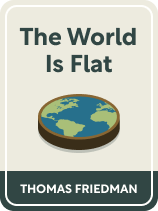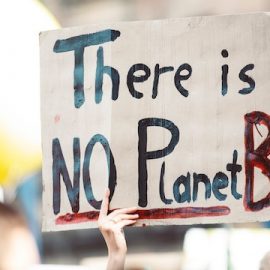

This article is an excerpt from the Shortform book guide to "The World Is Flat" by Thomas L. Friedman. Shortform has the world's best summaries and analyses of books you should be reading.
Like this article? Sign up for a free trial here.
What are some of the best quotes from The World Is Flat? What captures the essence of the book?
Thomas L. Friedman’s The World Is Flat examines the causes, effects, and potential future of a globalized world. By understanding how the world is changing, countries, communities, and individuals can better position themselves to thrive in the 21st century.
Continue reading for some hand-picked quotes from The World Is Flat to help you get the gist of the book.
5 Quotes from The World Is Flat
Enjoy these five quotes from The World Is Flat, along with context and explanation.
Quote #1:
Communism was a great system for making people equally poor—in fact, there was no better system in the world for that than communism. Capitalism made people unequally rich.
According to Friedman, the political change that initiated the process of globalization was the fall of the Berlin Wall on November 9, 1989. This event marked the end of the Cold War, a victory of capitalism and free markets over communism and government-run economies. This then encouraged the rest of the world to also adopt free-market strategies.
Friedman mentions that the flat world gave power to billions of people, making globalization one of the best ways to lift people out of poverty. Here are a few ways globalization helps people in underdeveloped countries:
- By letting people sell in the markets of developed countries: When people can sell their products to consumer-rich populations, they will make a lot more money.
- By creating jobs: As more money comes in, jobs in manufacturing, exporting, and other industries become available.
- By increasing skills and knowledge: When a country opens up to trade, people will gain the skills and knowledge to thrive in a global economy.
Quote #2:
When you study history and look at every civilization that has grown up and died off, they all leave one remnant: a major sports colosseum at the heart of their capital. Our fate can be different, but only if we start doing things differently.
Friedman argues that globalization is the most significant force shaping the world today, one that presents every person, group, and country with new opportunities and challenges. As one of the most powerful and wealthy nations in the world, the United States has a lot to gain and lose from this rapidly changing world. Yet despite the many challenges, America has all the tools necessary to thrive in a global economy. If it wishes to do so, it must focus on three things: education, government policies, and infrastructure.
Quote #3:
Girls, when I was growing up, my parents used to say to me, “Tom, finish your dinner—people in China and India are starving.” My advice to you is: “Girls, finish your homework—people in China and India are starving for your jobs.” And in a flat world, they can have them, because in a flat world there is no such thing as an American job. There is just a job, and, in more cases than ever before, it will go to the best, smartest, most productive, or cheapest worker—wherever he or she resides.
Friedman explains that, when the world became connected by the internet, the outsourcing of jobs grew cheaper because communicating and collaborating over long distances became easier. For example, around 2000, outsourcing from America to India became popular. American companies paid Indian companies to help with their call centers, business operations, or any other form of work that could be digitized. Many of the middle-class jobs people relied on in the past will no longer exist in the flat world. They’ll be automated, outsourced, or simply obsolete.
Quote #4:
Today’s workers need to approach the workplace much like athletes preparing for the Olympics, with one difference. They have to prepare like someone who is training for the Olympics but doesn’t know what sport they are going to enter.
If you can quickly adapt, take on new roles, and provide value in multiple ways, you’ll be irreplaceable. He argues that being a specialist can be dangerous in a flat world because the world can change in an instant, leaving you and your specialized field behind. Experts in one programming language, for example, may find themselves out of a job when that language becomes obsolete. But, if you’re versatile and know multiple languages, you’re less likely to run into this problem.
Quote #5:
What makes America unique is not that it built MIT, or that its grads are generating economic growth and innovation, but that every state in the country has universities trying to do the same.
One of America’s strengths is its robust network of research and science institutions, and Friedman argues that maintaining the strength of this network will be vital to success in the flat world. These research institutions, especially publicly funded universities, provide a great deal of the country’s innovation and scientific discoveries, which, in turn, are key factors in economic growth.

———End of Preview———
Like what you just read? Read the rest of the world's best book summary and analysis of Thomas L. Friedman's "The World Is Flat" at Shortform.
Here's what you'll find in our full The World Is Flat summary:
- How the world is becoming one globalized society
- The potential costs and benefits of a flatter world
- How you can best contribute to a globalized society






